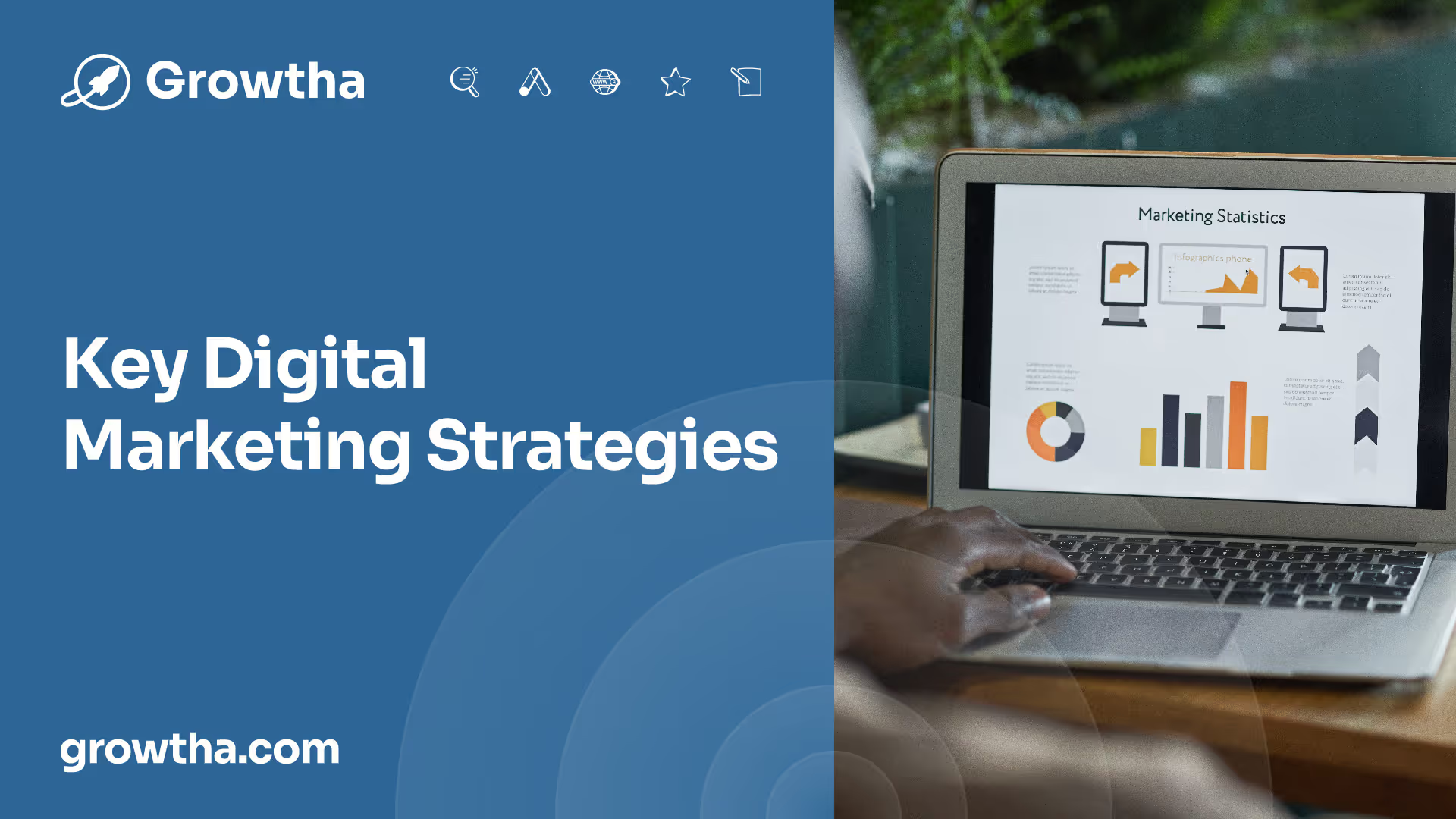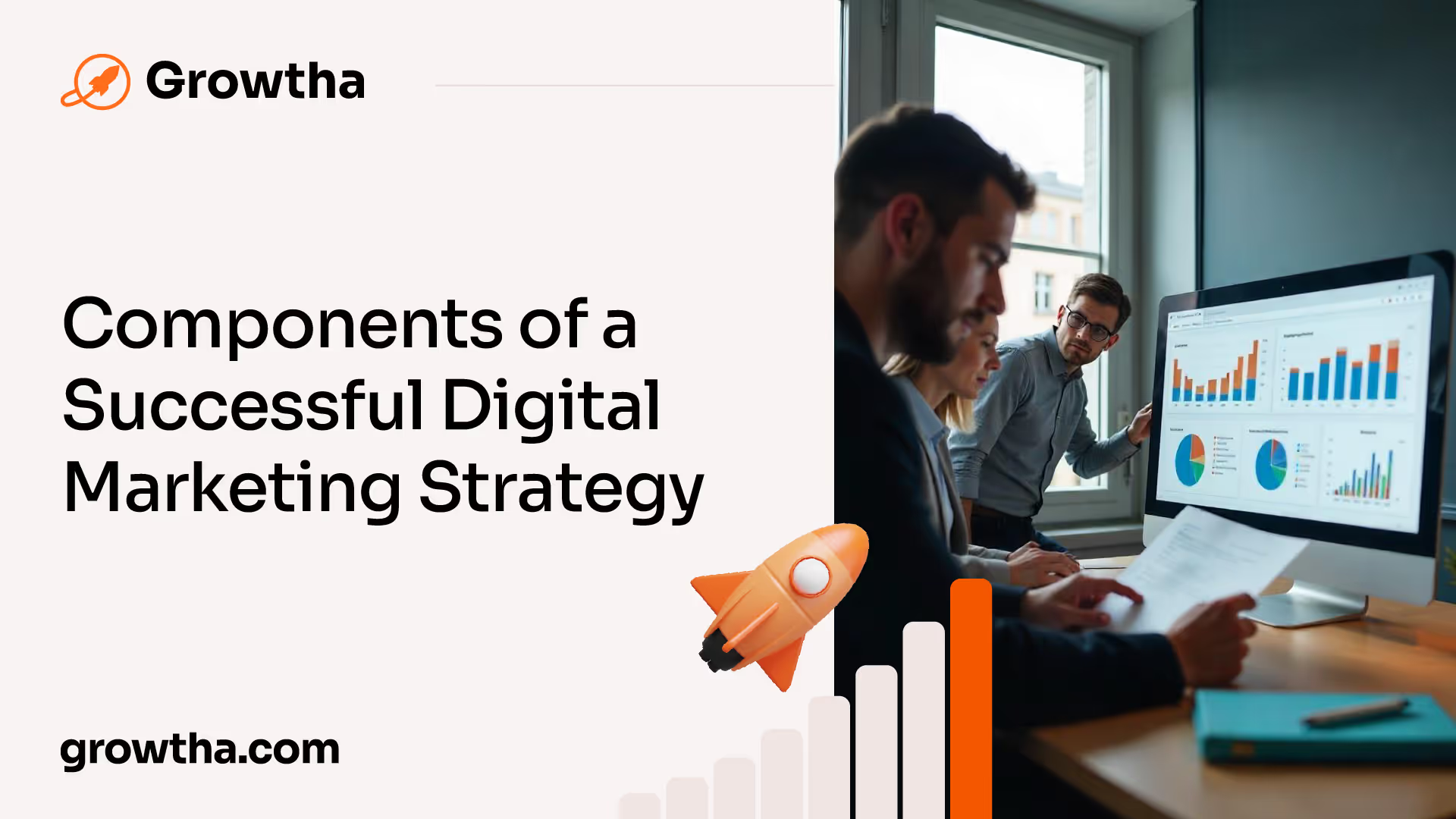Where to Start with Digital Marketing?
Two crucial starting points are understanding your target audience and setting goals that align with your business objectives.


Where to Start with Digital Marketing?
Where to Start with Digital Marketing?

When venturing into the world of digital marketing, it's essential to have a clear understanding of where to begin. Two crucial starting points are understanding your target audience and setting goals that align with your business objectives.
Understanding Your Target Audience
Before diving into any digital marketing strategies, it's important to identify and understand your target audience. The target audience refers to the specific group of consumers most likely to be interested in your product or service. By defining your target audience, you can tailor your marketing efforts to reach and resonate with the right people.
To determine your target audience, you need to analyze the data you receive from consumer engagements, evaluate current buyers and purchase trends, and optimize your approach as new information is revealed. Consider factors such as age, gender, income, location, interests, and other relevant demographics. This will help you build a detailed profile of your ideal customers, also known as buyer personas.
Understanding your target market allows you to build relationships and better communicate with consumers. Personalized interactions can significantly impact consumer behavior, with 80 percent of consumers more likely to do business with a brand that offers personalized experiences. By tailoring your digital marketing efforts to resonate with your target audience's needs and preferences, you can increase the effectiveness of your campaigns.

Importance of Setting Goals
Once you have a clear understanding of your target audience, the next step is to set goals that align with your business objectives. Your goals should be specific, measurable, achievable, relevant, and time-bound (SMART). They provide a roadmap for your digital marketing efforts and help you track your progress.
Setting goals allows you to have a clear focus and direction for your digital marketing strategy. It helps you stay motivated and ensures that your efforts are aligned with your overall business objectives. Whether your goals are to increase brand awareness, drive website traffic, generate leads, or boost sales, they provide a benchmark for success and guide your decision-making process.
Regularly monitor and evaluate your progress toward your goals. If necessary, make adjustments to your strategies to optimize results. By continually analyzing and refining your digital marketing efforts, you can enhance your effectiveness and achieve better outcomes.
In summary, a successful digital marketing strategy starts with understanding your target audience and setting goals that align with your business objectives. By identifying your target audience and developing detailed buyer personas, you can tailor your marketing efforts to resonate with the right people. Additionally, setting clear goals provides focus and direction, ensuring that your digital marketing efforts are purposeful and measurable.

Digital Marketing Channels
When starting with digital marketing, it's essential to understand the different channels available to reach and engage with your target audience. Digital marketing channels can be divided into three main categories: owned media, earned media, and paid media. Each category serves a unique purpose and requires specific strategies to maximize their effectiveness.
Owned Media
Owned media refers to the digital assets that you have control over, such as your website, blog, and social media profiles. These channels allow you to directly communicate and engage with your audience. By creating valuable and relevant content, you can attract and retain your target audience, ultimately building brand loyalty and increasing conversions.
Examples of Owned Media
Website
Blog
Social Media Profiles
Through your owned media channels, you have the opportunity to showcase your expertise, provide valuable information, and establish your brand's voice and identity. Regularly updating and optimizing your owned media channels is crucial for maintaining a strong online presence and driving organic traffic to your website.
Earned Media
Earned media refers to the recognition and exposure your brand receives through word-of-mouth, reviews, recommendations, and media coverage. Unlike owned media, earned media is generated by others, such as satisfied customers, influencers, or journalists. It is a testament to the quality of your products or services and the positive experiences people have had with your brand.
Examples of Earned Media
Customer Reviews
Social Media Mentions
Influencer Endorsements
Media Coverage
Building earned media requires providing exceptional customer experiences, delivering high-quality products or services, and engaging with your audience effectively. By fostering positive relationships with your customers and influencers in your industry, you can increase the likelihood of earning valuable earned media.
Paid Media
Paid media involves paying for advertising space or sponsored content to promote your brand, products, or services. This can include search engine advertising, display ads, social media ads, influencer collaborations, and sponsored content on relevant websites. Paid media provides a controlled and targeted approach to reaching your audience, allowing you to tailor your message to specific demographics or interests.
Examples of Paid Media
Search Engine Advertising
Display Ads
Social Media Ads
Influencer Collaborations
Sponsored Content
Paid media offers a quicker way to increase your brand's visibility and reach a wider audience. However, it's essential to develop a well-thought-out strategy and closely monitor your campaigns to ensure they align with your goals and deliver a positive return on investment (ROI).
By utilizing a combination of owned media, earned media, and paid media, you can create a comprehensive digital marketing strategy that maximizes your brand's visibility, engages your target audience, and drives conversions. It's important to continuously evaluate and adjust your approach based on data and insights to optimize your digital marketing efforts.

Key Digital Marketing Strategies
When starting with digital marketing, it's essential to have a solid understanding of the key strategies that will help you effectively reach and engage your target audience. Here are four fundamental strategies to consider: search engine optimization (SEO), social media marketing, email marketing, and content marketing.
Search Engine Optimization (SEO)
Search Engine Optimization (SEO) plays a crucial role in ensuring visibility on search engine results pages (SERPs) and driving organic traffic to your website. By optimizing your website and its content, you can improve your website's ranking in search engine results, making it easier for potential customers to find you when they search for relevant keywords.
Key components of an effective SEO strategy include keyword research, on-page optimization (such as optimizing title tags, meta descriptions, and headings), creating high-quality content, building authoritative backlinks, and ensuring your website is mobile-friendly. By implementing these tactics, you can increase your website's visibility and attract more targeted traffic.

Social Media Marketing
Social media platforms like Facebook, Instagram, LinkedIn, and Twitter offer powerful opportunities to engage with your target audience and build brand recognition. Through social media marketing, you can create and share content, interact with your audience, and promote your products or services.
To effectively leverage social media marketing, it's important to identify the platforms most relevant to your target audience and develop a strategic plan for content creation and distribution. By consistently providing valuable and engaging content, you can foster meaningful connections with your audience and drive traffic to your website.
Email Marketing
Despite the emergence of new marketing channels, email marketing remains a highly effective strategy, with an average return on investment (ROI) of $42 for every dollar spent. Email marketing allows you to directly reach your audience's inbox, providing personalized and targeted messages.
To succeed with email marketing, it's important to build a quality email list of subscribers who have shown an interest in your brand. By segmenting your list and delivering relevant content and offers, you can nurture relationships with your subscribers and drive conversions. Additionally, regularly analyzing and optimizing your email campaigns can help you continually improve your results.

Content Marketing
Content marketing is a crucial component of any successful digital marketing strategy, with 70% of marketers actively investing in content marketing. By creating valuable and relevant content, such as blog posts, videos, and infographics, you can attract and engage your target audience.
A robust content marketing strategy involves conducting thorough audience research, understanding their needs and pain points, and creating content that addresses those needs. By consistently delivering valuable content, you can build trust, establish your brand as a thought leader, and ultimately drive conversions.
These key digital marketing strategies form the foundation for a successful digital marketing campaign. By implementing an integrated approach that combines these strategies, you can effectively reach your target audience, drive engagement, and achieve your marketing goals. Remember to continually monitor and analyze your efforts to optimize your strategies and ensure long-term success.

Components of a Successful Digital Marketing Strategy
To embark on a successful digital marketing journey, it is important to understand the key components that contribute to an effective strategy. These components include website optimization, content strategy, utilizing digital marketing channels, and analytics and data measurement.
Website Optimization
The foundation of any digital marketing strategy lies in website optimization. Your website serves as the primary point of contact for your audience, so it is crucial to create a professional and user-friendly online presence. A well-optimized website can improve user experience, increase conversions, and enhance search engine visibility.
Key aspects of website optimization include:
- Responsive Design: Ensuring your website is mobile-friendly and can adapt to different screen sizes.
- Fast Loading Speed: Optimizing your website's performance to minimize loading times and provide a seamless browsing experience.
- Intuitive Navigation: Creating a user-friendly interface with clear navigation menus and logical site structure.
- Effective Call-to-Actions (CTAs): Placing prominent CTAs throughout your website to guide visitors towards desired actions, such as making a purchase or filling out a contact form.
By prioritizing website optimization, you can provide a positive user experience and encourage visitors to engage with your brand.
Content Strategy
Content marketing is a fundamental component of a successful digital marketing strategy. By creating valuable and relevant content, you can attract and engage your target audience, ultimately driving conversions. A well-defined content strategy involves:
- Identifying Target Audience: Understanding your audience's needs, preferences, and pain points to create content that resonates with them.
- Keyword Research: Conducting keyword research to identify relevant topics and optimize your content for search engines.
- Content Creation: Developing high-quality content in various formats, such as blog posts, videos, infographics, and ebooks, to cater to different audience preferences.
- Consistency: Establishing a consistent content publishing schedule to nurture your audience and build trust.
A well-executed content strategy can position you as an industry authority and attract organic traffic to your website.

Utilizing Digital Marketing Channels
To reach a wider audience and achieve your marketing goals, it is important to leverage various digital marketing channels. The key channels to consider include:
- Search Engine Optimization (SEO): Optimizing your website and content to improve organic search visibility and drive targeted traffic from search engines.
- Social Media Marketing: Engaging with your audience on platforms like Facebook, Twitter, and Instagram to build brand awareness, foster customer relationships, and drive traffic to your website.
- Email Marketing: Sending personalized and targeted emails to nurture leads, drive conversions, and build long-term relationships with customers.
- Paid Advertising: Utilizing paid channels like search engine advertising, display ads, and social media ads to reach a wider audience and drive immediate results.
By utilizing a combination of these digital marketing channels, you can effectively connect with your target audience and maximize your online presence.

Analytics and Data Measurement
Data-driven decision making is crucial for the success of your digital marketing strategy. By tracking key metrics and analyzing data, you can gain insights into the performance of your campaigns and make informed optimizations. Key metrics to consider include:

Analyzing these metrics allows you to identify areas for improvement, optimize your campaigns, and allocate resources more effectively.
By integrating website optimization, content strategy, digital marketing channels, and analytics and data measurement, you can lay a strong foundation for a successful digital marketing strategy. Remember to adapt and refine your strategy based on the evolving needs of your target audience and the ever-changing digital landscape.

Key Metrics for Measuring Digital Marketing Success
When it comes to digital marketing, measuring success is essential to understand the effectiveness of your strategies and make data-driven decisions. Several key metrics help assess the performance of your digital marketing efforts. Let's explore some of these important metrics:
Website Traffic
Website traffic is a critical metric for digital marketing success, as it serves as the home base and face of a brand. All digital marketing efforts are aimed at driving traffic to the website. Regularly measuring website traffic metrics provides insights into campaign performance, highlights successful strategies, and detects potential technical issues that may deter visitors. It allows you to understand the effectiveness of your marketing efforts in attracting and engaging your target audience.
Conversion Rate
Conversion rate is a crucial metric in digital marketing. It calculates the percentage of website visitors who complete a desired action, such as making a purchase, filling out a form, or subscribing to a newsletter. Understanding the conversion rate helps in gauging the effectiveness of your campaigns in turning visits into actual sales or desired actions. By monitoring and optimizing the conversion rate, you can identify areas for improvement and make data-driven adjustments to your marketing strategies.
Cost per Acquisition (CPA)
Cost per Acquisition (CPA) is another important metric to monitor in digital marketing. It helps in determining the cost incurred to acquire each new customer. By tracking the CPA and comparing it with industry standards and product costs, businesses can evaluate the efficiency of their marketing spending. Monitoring the CPA allows you to optimize your budget allocation and identify opportunities to reduce costs while maintaining or improving acquisition rates.
Return on Investment (ROI)
Return on Investment (ROI) is a crucial metric in digital marketing that evaluates the overall results of a marketing campaign compared to the cost involved. It measures the profitability and effectiveness of your marketing efforts over time. By tracking the ROI and considering all marketing costs, businesses can assess the success of their digital marketing strategies. Monitoring ROI helps in identifying high-performing campaigns, optimizing marketing spend, and making informed decisions about future investments.
By tracking and analyzing these key metrics, businesses can gain valuable insights into the performance of their digital marketing efforts. These metrics provide a quantitative understanding of the impact of your strategies and help you make data-driven decisions to optimize your marketing campaigns. Remember, it's important to regularly monitor these metrics, set realistic goals, and adapt your strategies based on the insights gained from the data.
References
[1]: https://www.marketingevolution.com/marketing-essentials/target-audience
[2]: https://www.springboard.com/blog/business-and-marketing/digital-marketing-channels/
[3]: https://www.semrush.com/blog/digital-marketing-channels/







